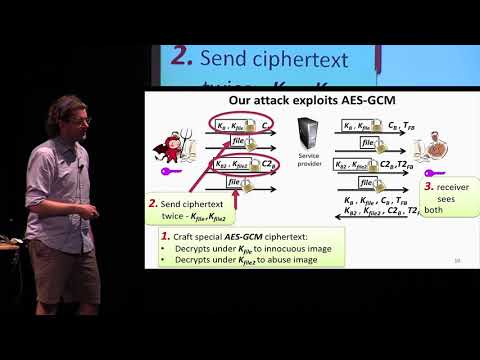Welcome to the resource topic for 2019/016
Title:
Fast Message Franking: From Invisible Salamanders to Encryptment
Authors: Yevgeniy Dodis, Paul Grubbs, Thomas Ristenpart, Joanne Woodage
Abstract:Message franking enables cryptographically verifiable reporting of abusive content in end-to-end encrypted messaging. Grubbs, Lu, and Ristenpart recently formalized the needed underlying primitive, what they call compactly committing authenticated encryption (AE), and analyzed the security of a number of approaches. But all known secure schemes are still slow compared to the fastest standard AE schemes. For this reason Facebook Messenger uses AES-GCM for franking of attachments such as images or videos. We show how to break Facebook’s attachment franking scheme: a malicious user can send an objectionable image to a recipient but that recipient cannot report it as abuse. The core problem stems from use of fast but non-committing AE, and so we build the fastest compactly committing AE schemes to date. To do so we introduce a new primitive, called encryptment, which captures the essential properties needed. We prove that, unfortunately, schemes with performance profile similar to AES-GCM won’t work. Instead, we show how to efficiently transform Merkle-Damgärd-style hash functions into secure encryptments, and how to efficiently build compactly committing AE from encryptment. Ultimately our main construction allows franking using just a single computation of SHA-256 or SHA-3. Encryptment proves useful for a variety of other applications, such as remotely keyed AE and concealments, and our results imply the first single-pass schemes in these settings as well.
ePrint: https://eprint.iacr.org/2019/016
Talk: https://www.youtube.com/watch?v=3M1jIO-jLHI
Slides: https://crypto.iacr.org/2018/slides/28863.pdf
See all topics related to this paper.
Feel free to post resources that are related to this paper below.
Example resources include: implementations, explanation materials, talks, slides, links to previous discussions on other websites.
For more information, see the rules for Resource Topics .
